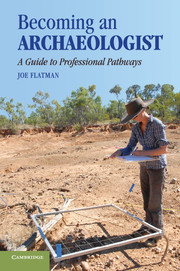Book contents
- Frontmatter
- Contents
- Tables and Figures
- Preface and Acknowledgments
- Introduction
- One What Is – and Isn't – Archaeology?
- Two Skills and Training
- Three Cultural Resource Management
- Four Academia
- Five Local Government
- Six Central Government
- Seven Public and Community Archaeology
- Conclusion
- Appendix 1 Useful Websites
- Appendix 2 Glossaries
- Appendix 3 Suggested Equipment to Take on an Archaeological Project
- References
- Index
Two - Skills and Training
Published online by Cambridge University Press: 05 June 2012
- Frontmatter
- Contents
- Tables and Figures
- Preface and Acknowledgments
- Introduction
- One What Is – and Isn't – Archaeology?
- Two Skills and Training
- Three Cultural Resource Management
- Four Academia
- Five Local Government
- Six Central Government
- Seven Public and Community Archaeology
- Conclusion
- Appendix 1 Useful Websites
- Appendix 2 Glossaries
- Appendix 3 Suggested Equipment to Take on an Archaeological Project
- References
- Index
Summary
Introduction
The archaeological job market, as can be inferred from the discussion in Chapter 1, is akin to a small island on a geologic fault line: community-based with a nice lifestyle and amazing opportunities, but also volatile, owing largely to factors outside the population's control. One consistent outcome of all the different professional surveys of archaeologists, though, is that of training and education. The modern archaeologist is exceptionally well trained, with at least one (and often several) degree and qualifications in archaeology or a related subject, backed up by a raft of different experience.
Until even fairly recently it was still possible to get a job in archaeology with a lot of experience but only a little learning. The opposite is now true, however – statistically, a lot of learning and a little experience are the defining characteristics of the young professional archaeologist. Many would argue that this is a bad thing – that archaeologists with real, well-honed field experience are in shorter and shorter supply and that this is harming the practice of archaeology at a fundamental level. This is certainly a recurrent theme of meetings and conferences of CRM archaeologists, who feel that the university sector is letting them down, churning out ever more graduates from the academic “sausage factory” who simply do not have the skills required for the posts that need to be filled. Such a debate is not within the scope of this book.
- Type
- Chapter
- Information
- Becoming an ArchaeologistA Guide to Professional Pathways, pp. 47 - 83Publisher: Cambridge University PressPrint publication year: 2011



